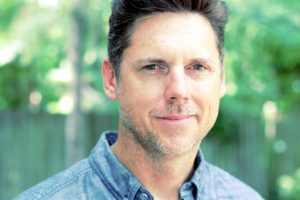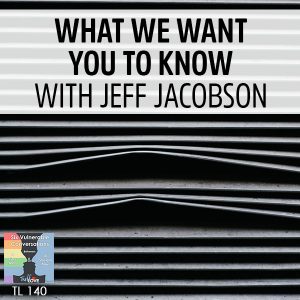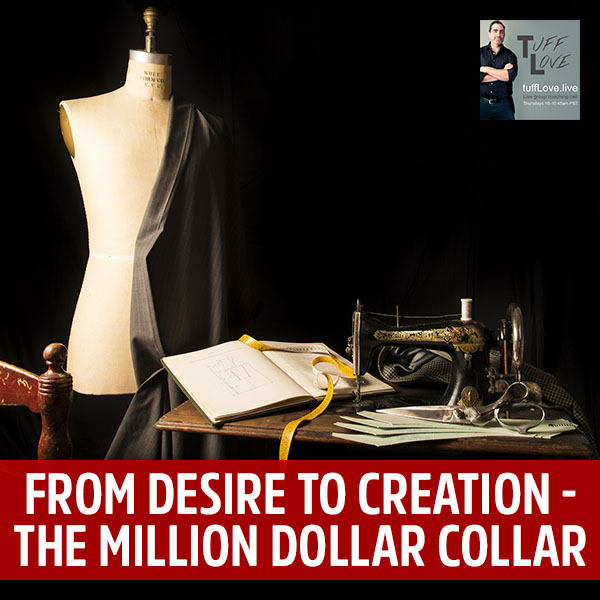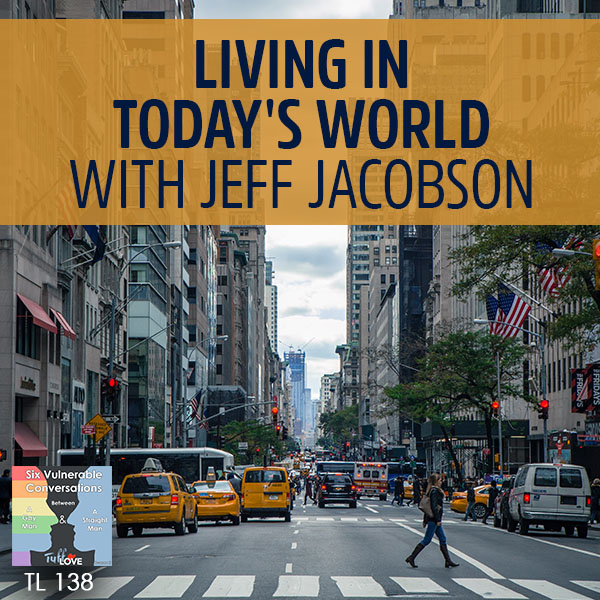
074: Getting OUT of your Comfort Zone with Tripp Lanier
May 30, 2017
The path of growth is always a process that has no finish line. It’s natural to not want to step out of your comfort zone. The comfort zone is another term for hiding space. When we feel secure, we want to stay there. As a business owner, this isn’t growth but rather a form of stagnation and you end up being run over by the competition. When you step out of your comfort zone, the first big step is to get out of isolation and see what others around you are doing.
—
On this episode, we have Tripp Lanier, an amazing man who’s had a podcast for ten years, The New Man Podcast. A coach, also an amazing musician and a great guy. We talk about his journey and how he got from point A to point B and what he’s learned and also some of his viewpoints around coaching. We then bring our friend on the line, who talks about where he’s stuck, teach him of how to be a coach and how to move past himself.
074: Getting OUT of your Comfort Zone with Tripp Lanier
How are you Tripp? It’s good to have you on the show.
It’s good to be here. I like wading into these new waters. This is interesting.
Yes, it’s a whole new world. We’re here to talk about getting out of your comfort zone. That part of ourselves that are so used to the prisons and the rooms that we hold on and the places where we feel comfortable. First off, would you tell me what you do and how you do it, and what are your main techniques for getting people out of their comfort zone?
I’ve been coaching for over ten years. I’ve been coaching men and women all around the world, primarily men. These days, it’s really morphed into helping the people. I call them the good guys. They’re the folks that want to do good work in the world. They’ve already created some success, but they’re tired of it. There’s something about it that’s soul-crushing. That’s their comfort zone. That’s the thing that they’ve gotten used to. They know how to be successful in that way, and they’re afraid to make a professional lane change. They think they’re going to have to live in their car if they want to do good work in the world. They want to make a great living doing good work in the world, and so there’s this resistance. There’s this fear to get out of their professional comfort zone and then do this good work in the world or to level it up to the next place for them.
I deal with this comfort zone stuff in a lot of ways, but I like this intersection of what we believe we’re here to do in this lifetime and then our profession. I don’t like it when we do this personal development stuff and then we leave it out of our relationships or we leave it out of our professional world. It’s this kind of hiding. I call it hiding out. It’s where we align who we are, our values, and then also align that with the work that we do in our world. That means we’re going to bump up against a lot of different areas when it comes to where we’re comfortable and where we’re going to feel a little edgy.
How did this evolve? What’s your story, and how did you become a coach and become an educator?
I was that guy. Everything I described, I have been on that path. Very early on, I ran a media production company for ten years. I started that so I could be a musician and not starve to death. After awhile, I went through a big shift for me, personally and spiritually, and I felt like I was playing a role professionally. I felt like there was this guy that I became in order to go make money in the world, and then there was this other part of me that had all these other interests and desires. I want to align those things. I realized after I started coaching professionally that it was something I’ve always been doing. It was a natural extension of who I am, so I want to make a living doing this. I love being in conversations with people around what really matters and what they want to actually create in their life. That’s the nuts and bolts of it. That transition was an interesting story to say, the least. It goes on and on.
What were the steps that you did for yourself to get yourself out of the comfort zone? What were some main practices you found for yourself to get to become that person who want to become?
The first thing to recognize is that it’s an ongoing process. There’s not a finish line. There’s not a like, “I got out of my comfort zone in 2014 and now I’m done.” It’s always a process. If we’re on a growth path and we’re always up against our growth edge, at some point we’re going to be facing it. The things that I do, the big one is to get out of isolation. When we’re talking about this stuff with other people and we hear the stories come out of our mouth and they don’t add up. It’s so powerful to be able to have that mirror held up and like, “I can’t believe I’m telling myself this excuse, and that’s the thing that’s holding me back.”
Being out of our own little bubble and sharing the things that we want to do in the world and then the things that we think are in the way can be transformative in and of itself to realize that’s not the way I want to do it. As a coach, I believe in working with other coaches. I believe in working with other professionals, people that are going to influence you and challenge you and help you grow. I like being around people that are going to challenge me in that way. I don’t want to be in a situation where I’m not being challenged or I’m being lulled to sleep. I’m scared to go to sleep. That’s one of the fears that I have is. I felt like for years I was in some sleep-walking mode. I don’t want to go back to that.
Give us a war story of how the work you do affected someone. What’s one good example or one thing that you feel really good about in terms of your coaching practice?
We all have a hard time believing that we could actually provide value being that part of ourselves. Click To TweetOne that pops up, this happened recently, but there’s a guy. He was a former Navy SEAL and had been out of the SEAL teams for several years and was doing what he thought was his thing. He was doing corporate training work. As I got to know him, I realized his real power, the thing that had him feel alive, was being in motion, being out in the world, being in the woods, and jumping out of planes and getting into the water. That’s why he became a SEAL to begin with. He had abandoned all of that and he didn’t see the possibility of incorporating that into how he helped other people. Over the last few months, we’ve created a coaching program with him at the center of it. He just led an expedition where in one weekend they go kayaking and they jump out of an airplane to go climbing. They do all this crazy things, and he’s like, “I can’t believe I’m getting paid to do this.” He’s doing tremendous work with these people. That’s what I mean. There’s this natural, “Who are we on an essential level?” We all have a hard time believing that we could actually provide value being that part of ourselves instead of like, “I have to go play this professional role in order to be successful.”
A lot of us go on that path, the path that we think is the right one or the complete one or the one we should, but then we’re miserable. We’re miserable in that place where we’re not truly living who we are. We’re out of our purpose, and where we’re living someone else’s script for some other movie. That worked, to go from, “No, you’re an outdoors guy. You’re a guy that should be out in the world helping people find themselves.” That’s beautiful.
It is, and that’s where we feel most alive. I’ve had these moments in my life where the people that have inspired me and when I see them doing what they’re doing, I’m like, “You can do that? Really?” It’s like if you know the chef at the restaurant, why would you always just look at the menu and settle for that? If you know the chef, you’re like, “What do you got that’s really good? Make something really cool for me.” Most of us don’t realize we know the chef. We don’t have to settle for whatever is on the menu. It takes effort to say, “What is it that I do want? What’s the thing that would light me up?” It doesn’t take any more effort to ask for that than it does to say, “I’ll take item number four.” The big thing is training our mind to get out of this place where we’re settling for the options that are presented to us and instead asking ourselves, “What do I want? What is exciting for me? What wants to be expressed as me?”Most of us have learned to shut that off because it was too painful to try and hear that voice and go do the thing we thought we had to do in order to be successful.
You whacked me there, and which I want to stay grateful for. How that happened was I never would think to go talk to the chef and ask for what’s good. That’s the thing that most of us don’t think we have permission to. We don’t have the ability to ask outside the menu and outside of the box.
That’s one of the things with the games that I play with my clients. We’d get in these groups. We just get into this domesticated way of living, and then we don’t understand why we’re chronically dissatisfied. We’re good at complaining like, “Food sucks. Nothing’s good.” Just flip it and say, “What do I want?” The next step is, “What if I asked for that?”We actually play a game with that. I had one guy literally go to Chipotle and ask if he can make his own burrito the way that he wanted to make it. Of course, everybody looks at him like he’s insane, but that’s an example of getting outside of their comfort zone. What’s the worst that can happen? Somebody says no, and somebody looks at your little weird, or you might make the most amazing burrito of your life. That burrito story inspired all the other guys in the group. It just lit everybody up. You’d be amazed at what those little things are. When you turn that complaint, that thing that’s dissatisfaction, you turned that into a request and then go make that request. They realized people start saying yes. “Sure, you want to do this. That’s great. We can do that.”
I also thought it could be the worst burrito of your life, but just having the courage to say, “I want to make my own burrito.” This isn’t an analogy of course, but that’s amazing, because that’s what most people don’t do. They’re so afraid of making the worst burrito of their life that there’s no chance to ever make the best one.
They’re afraid of somebody looking at them. What’s the worst that could happen in some of these situations? It’s really pretty small, that penalty or that thing that we’re worried about. When you put it out in front of ourselves like, “Those little things are steering me into this cage. I don’t speak up for what I want. I don’t go for what I want. I just walk around chronically dissatisfied. What if it didn’t have to be that way?” This is the matrix we’re in. You don’t have to tolerate this crap.
The second thing that story reminded me of, there was a restaurant in San Francisco, a Chinese food place. I cannot remember the name of it, it has been a good ten or twelve years since I’ve been there. Even longer than that when I was in Corporate America. You sit down and be like, “I like the chicken and broccoli,” and the waitress goes, “No, you don’t want that.” I’d be like, “The Szechuan chicken?” They’re like, “No, you don’t want that.” This is what you want. They would basically order for you. It was a dominatrix Chinese place. That story reminded me of that as well.
I ate at a Moroccan restaurant in Paris, France like that. We walked in and we ordered three things. They’re like, no. They brought out something completely different. “This is what you want,” and they were right. Sometimes our comfort zone might be to let go, and allow ourselves to receive.

Comfort Zone: Sometimes our comfort zone might be to let go and allow ourselves to receive.
That’s awesome. I’m jealous of your podcast, just because you’ve done such an extraordinary job with The New Man Podcast. I read some of your stuff. You had over a million downloads for men helping you and enriching you. The work you do is just helping. Why do you do it? What’s the thing behind the podcast that has you keep doing it week after week for all this time?
The podcast has been going on for ten years now. When I had the opportunity to get it going, I was living in Boulder and I actually knew people that were writing books. I was in that circle of people that were creating great things. I still had relationships with people out in the real world. I realized, here’s this life changing material, but it’s never going to help the people that I know that are really struggling in their life, because it’s not presented in a way that’s accessible for them. I thought that sucked. It was for the guys who are already on top of the mountain. They understood this language and these codified languages. What about the guy that needs this stuff translated into his language? How do we help that guy?
For me, I believe there were some really great truth to a lot of the things that I was learning and studying, but I want to present this in a way that the rest of us can appreciate and use as well. I didn’t just want it to be for a very small sliver of the population. That was the gist of it. When I would do interviews, I would actually imagine two people that I actually knew in my life. I would imagine they were in the room, and I knew when they would call bullshit or give me some weird look. That would be my cue to stop and ask the guests, what do you mean? What does that mean? What if my guy right now is rolling his eyes? It just helped really ground the interview and make it much more practical and useful.
Who has been a guest that really inspired you to move out of your comfort zone and what did they say? Do you have a memory of that?
I don’t know how to answer that question. There was one time when I had Vernon Reidon the show. He’s not a personal development guy. He’s the guitarist for one of my favorite bands, Living Colour. It was a weird and incoherent interview, because he’s such a creative guy. I remember holding on for dear life and that in that discussion. What I took away from that after I left that interview, I was like, what would it have been like to grow up with him in my life? Encouraging and taking a stand for being creative and going for what you really want and be ballsy in that way. I got that he grew up or he had a mindset about creating our lives and going for what we really want that I didn’t grow up with it. I envied that. I would love to have more of that influence in my life, because he’s a professional creative artist and he’s still going at it today. This is what he does. He’s just an artist, and I and I see our lives in that way. We don’t create art for the sake of having it on a canvas. We could take that approach to our own lives and take risks and be willing to try things instead of needing to have it all figured out beforehand. He comes up, and I wish I’d had more of that influence growing up and less of, “You’ve got to know everything and you’ve got to play it safe.”
I know Vernon Reid was one of the least known guitar player who was like a virtuoso. I remember reading about him. He’s like one of the best guitar players of that generation and also just wasn’t known like Eddie Van Halen or Jimi Hendrix, but apparently people did compare him to that.
He’s a monster. When I was coming up, I remember I’d normally go see a show and I’d be inspired and be like, “Yes, that makes me want to play.” They’re killing it. They did it. They’re done. They laid it down.
You are a musician. Tell us a little about your music career.
I have always been heavily into music growing up. It’s part of a lifestyle design thing. I went through college and went through art school and then got into the media program. I knew early on that I wanted to design a business that was there to support my ability to create and to do things in the world. I never wanted a job. I never wanted a thing that was a ladder or anything like that. I need something that’s going to help me make X amount that’s going to be fun, and then it’s going to give me the time and the freedom so I can go do these other things. I was 23 years old and was too young and dumb to realize that it was crazy, and I set that up. In my twenties, I was able to travel around. I basically had my own record company and we made our own records and I got to lose money that way. It allowed me to go to Los Angeles and make records for other artists and work in some of the best studios in the world. The studios where some of my favorite records are made. I’ve got to go do that. It was fantastic, and I played full out. I really felt good. It was so exciting to be able to do that. Being in a band is like being in a group of pirates. You go into a club, you get out of your van, you smell and you’re like, “This place is ours tonight. We’re taking it over.” It’s just an “I can do anything” feeling. I love that. I really miss that.
Why did you stop?
You don’t get to decide if people are going to like what you do. Click To TweetI got tired. It wasn’t fun anymore. It became about trying to get somewhere, and a lot of it was egoic. I was making good money in my business, and so when the game plan became to have a record deal, that meant I would take a pay cut and live in a van. I was like, screw this. I didn’t want to play that game anymore. I was burnt out to. I lost the fun of it. I went through a death period with it, but in the last few years, it’s reignited. I love music again. I love it a lot more because I’m not trying to force it anywhere trying to make something happen. It doesn’t define me. Whatever gig or whatever happened that week, my self-worth isn’t attached to whatever’s happening for me musically. That was happening for me back at the time, and that’s a tough thing. You don’t get to decide if people are going to like what you do. I enjoy the service aspect of what I do as a coach, because I know that I can actually get better at serving people, but as a musician, I never knew if I could get better at writing songs. You never know if people are going to like them. You don’t get to choose. You get to make your thing and hope that you find your audience. I really love the thing like, “No, I can get better. I can get better at serving people. I can continue to grow and expand that way.”
I’m sure there’s many people whose lives you’ve influenced that are grateful that you made that choice to come and help them instead of work on the music. I know you’ve impacted me. The interview we did last time was really special to me and so I’m really grateful for that.
Thank you.
Live Coaching
Let’s bring Scott on the line and then we could do a little coaching. Scott, it’s good to have you. Thanks for coming on. How can we make this most optimal for you? What would you like to talk about?
I’m an entrepreneur. I’m doing life coaching now as well. I’m really interested in what you guys are talking about, moving out of being small and stepping out and being seen, and dealing with what success looks like, what I want it to look like. Part of what I do is about getting out there. I just ran my first webinar. I just created an online course. That’s really exciting, but it’s also a little bit scary.
If there was one question you had that we could address, take your time to really figure out what that question would be. It doesn’t have to be the ultimate question, but it would be a nice doorway into something. It doesn’t mean you got to ask me the question as if I have the answer, but what’s the question you’re living into today?
That thing if you build something and it’s your baby and then you’ve got to put it out there. It’s dealing with the insecurity that comes up around that, whether you’re good enough, whether what you are creating is good enough, how are you going to be received? Trying to be successful is something I’ve always struggled with in my past. I used to be a filmmaker, and actually used to be in a band. That was one of the first things I did, it was being a musician. I always thought of really greatly and enthusiastic in all of those things, but I always hit this point where it just never quite happens the way I wanted it to. There was this thing of getting out of the small pond and stepping into the big pond and that’s frightening.
What’s the big pond for you now?
Dealing with a lot of clients and really high caliber clients, which I deal with a certain level now. Being seen, being out there, and having people listen to what I say, take it on board, and use that to change their life. There’s responsibility that comes with that.
What’s the thing that you’re concerned about by being seen and being visible by others?
There’s an element of vulnerability that comes with it. You can’t hide anymore. I’m actually a very private person, and I can feel there’s this block there for me around that.
What is it that we might see if you’re not hiding anymore?
Not being this idea that people have of me when they work with me. I’m a regular guy, I’m enjoying my life. There are elements of people that builds you up, and you could be that person that people see you as. You don’t have to, but there’s this expectation that comes with it.
Your fear is that people will have expectations of you and then you’ll feel some discomfort in that and around meeting those expectations?
Possibly.

Comfort Zone: It actually gets a lot more fun when we stop trying to look at ourselves the whole time and we just get out of the way.
If we could take that a step further, it’s like, “I’m afraid to disappoint people.” What if you disappointed somebody?
I feel crap. I feel like I let them down. I didn’t do enough. It’s like there’s this element of having and needing to have all the answers sometimes, and sometimes you don’t have the answers. That’s sometimes that’s a really interesting place to be in.
You are a coach. What if your job was not to have the answer? From the get go, it wasn’t about having the answers.
Generally, the answers come from the clients a lot of the time. It’s reflecting what’s going on in them and the way that blocks up and they find that themselves. There is a part of me that holds back when I work with clients.
How come? What are you afraid of?
The unknown. Not stepping into the place where I don’t know the answers. It’s interesting because I live my life from that place. I love not knowing what’s going to happen next. I love the adventure in that, but somehow it seems it’s a different thing when you’re promoting yourself and you’re trying to get your message out there and get traction with that.
What if you got over yourself? There have been a lot of this is where it is about you and that’s hard. That makes it hard. What if you said, “What if I’m not that important here? What if it’s not about Scott?” I say that because it actually gets a lot more fun when we stop trying to look at ourselves the whole time and we just get out of the way. It’s really hard for us to see what’s going to serve other people if we’re looking at it through this lens of, “How’s this going to make me look? What might this mean for me?” There’s this aspect that this small Scott is getting in the way of your bigger work. Yeah, small Scott’s fun and cool and right, but he also has a place in this and I’m getting that this is where he’s becoming a bottleneck for the work you really have to do here.
I’ll tell you a little story. Here’s why I almost quit being a coach. When I first started being a coach, I was really concerned about being a good coach. I had these other coaches that trained me and in my head, as I was coaching, there were judges that were holding up scores for the things that I said. I get off the call and be like, I messed up here and did this. I was so afraid to say certain things because I didn’t want the client to be pissed off and fire me. It was, screw that. It was terrible, so I said, that’s it. I’m quitting. I’m not going to coach anymore. This is miserable. If I’m going to quit, I might as well get fired. I started coaching from that free place. I have nothing to lose now. I’m going to say what I really think is going to serve them. What freed me was I’m willing to be fired at any session. As you can see, I didn’t quit, because it got fun then. It wasn’t about me anymore. I was able to let go and, and people got much more service. This comfort zone you’ve got right now, if we come back to the topic of our call, is just hanging out looking in the mirror, you have a choice. You can put that aside and say, what’s really going to serve this guy? Even if that means that I’m not really popular at the end of the call. What would happen if you chose to put that service first instead of self-image?
From the get-go, it wasn’t about having the answers. Click To TweetThis is our job, Scott. Our job is to say the uncomfortable things and to put them out of their comfort zone. This is what we do and this is why we’re hiring. This is what people won’t do in their real lives. In their real lives, they will not share the truths that make other people uncomfortable. People come to coaches and therapists and twelve steps and men’s groups and women’s groups, and they want the reflection of the things that no one will say to them. The tough love burns, but then it feels so good. It’s like you pull off the shackles. If you can focus on that piece, think about the freedom that you have the opportunity to co-create. That’s where the magic happens.
That’s definitely been some of my experiences with clients that I work with. It’s starting to get these clients coming through that are really high caliber people.
Do you think they poop? They’re just people. That’s the thing. When you start to buy into people’s bullshit, you’ve lost your ability to see them truly, to see them, that they’re all broken and neurotic, just like the rest of us. When you start designating high caliber and all this other stuff, you’ve actually lost seeing them. You got to imagine them without any skin or they had been on the toilet, like he’s just another person. Your job is to not believe in any of that stuff that they use to trick the rest of the world. It’s a masquerade. We’re here to do something bigger than buy in to the mask.
Let me give you this something else from the trenches, Scott. Every single client you have, for some reason, will say something that will trigger you. I don’t know why. It is like the Law of Coaching. The natural attraction of coaching is you’re going to pull clients in on stuff that you want to work on as a coach. That’s why it’s so important for us coaches to continue to do our work, because what’s going to happen is you’re going to get triggered. What I suspect is happening is that you have some doubt about who you are in the world or your ability or how special and incredible you are. These people who exude confidence, which we agree is a mask, but they’re triggering your lack of belief in yourself. That’s something you have to work on with someone else, so you can serve the world.
I don’t think that goes away. That doubt will be there. A lot of times we’re waiting for that. That’s one of the things that we are as coaches can do. “I’ll wait until I’m more confident to do this other work.” I don’t think it ever goes away, but it’s one of those things. There’s that part of me that’s looking in the mirror. There’s that part of me that has a doubt. Like, we’re all riding in the car together, but those guys don’t need to steer. They don’t need to be the ones behind the wheel. We love them, and accept them. They don’t have to be the ones coaching though. There’s a deeper part of you that knows and has something to say and serve. Otherwise you wouldn’t be doing this. Don’t wait for that stuff to go away. It’s not that you need permission from them to do it. I still deal with it twelve years in.
Talking about music before, I had the fear before I go onstage. When you go on stage you’d be fine, but even after 50 gigs that fear is always there.
We think the fear is wrong or the discomfort is wrong, so we stop and we need to analyze it. You expect it. It’s part of the gig. I think that’s why there’s so few great coaches or so few successful coaches, it’s because we haven’t learned. We haven’t learned that you do it anyway. You don’t wait for that to go away or until you have analyzed all this other crap.

Comfort Zone: We think the fear is wrong or the discomfort is wrong, so we stop and we need to analyze it.
The time when I don’t feel nervous going on stage before a talk, that’s the time where it’s feeling like maybe it’s time to move on or make yourself a bigger challenge. I’m doing three talks soon and I’m scared. I’ve done a thousand times in my career and I’m still scared of some imaginary police coming up and saying, “No, Robert, you can’t say that.” Like there’s some goon squad that’s going to physically remove you from the stage. That is an authentic fear inside of me and on some level, use your fear, let it propel you, and let it grow you.
I’ll speak to the other side of it, which is I hate that feeling. I really don’t like it. We don’t have to like it. We can romanticize it and have that cool reframe of it and I am definitely on board with that, but there’s also a part of this that I really don’t want to feel. This is really inconvenient. I want to speak to that, which is recognizing there’s still this part I would rather not feel that. Again, there’s a knowing. It’s a knowing. I want this thing more than I want to avoid this fear. If you have that knowing, then you just do it.
Any other way we can serve you Scott? You gave me a lot to think about.
It’s really nice. It’s nice to hear that from both of you guys.
I have one more question for you. I want to hear what you could do. What are you going to do right now or this next day that would be in a step of this no more hiding out? What’s the thing that would push you through that threshold?
It’s about everything I have set up. I’m doing webinars and some talks lined up back in London. It’s about going for it and not holding back and embracing the fear and challenging my clients more. Saying what I want to say, cutting through the bullshit and for myself as well. Calling out my own bullshit.
If we had more time, I would want to do something specific with you. I’d want to plant a stick in the sand and say this is it. We can always come back to this moment. I would want to create that with you. What’s that specific thing that when I went and did it, I know I can do this, and we always come back to it because the fear is not going to go away. When we say more or better, it’s so easy to get lost in that malaise. What’s the thing you’ve been waiting to do? What’s the thing you’ve been avoiding specifically? It’s a phone call, it’s a proposal. You’ve got a client that’s still paying you ten bucks an hour and you’re worth twenty times that now. What’s the thing you’re settling for?
Use your fear, let it propel you, and let it grow you. Click To TweetI’m doing these online classes once a week. Every week we have some great people join that and really create something and having to feel like it’s really successful is what I want and they’re getting a lot out of it.
If we had more time, we would break that down into those things. The first thing I want to really feel is that you really want it. I actually want to feel fierceness in you, from love like, “I want this so bad. I’m not going to tolerate the fear. I’m not going to tolerate the resistance. I’m not going to tolerate anything that gets in the way. This is going to happen, because this is what I’m here to do.” That’s the thing I want to invite you to do. There’s a part like, “I’m not going to be stopped. This is going to happen. I’m going to have this thing going.” We go and create. That’s what it means. There’s that commitment in both feet getting out of their comfort zone. Thank you, Scott.
Thanks.
That’s the fastest 40 minutes of my life every time right here.
Thank you. I had a lot of fun and I appreciate you doing this. I’m always looking for ways to grow and stretch, and so this is so much fun.
How do people find you? How do people work with you?
Easiest way is to go find The New Man Podcast. There’s a ton of stuff available at TheNewManPodcast.Com. Everything we just talked about comfort zone and resistance, I just created a twenty-minute micro course. It’s available there. It’s free. Go through it. A big part of the resistance is we don’t even know that were in it. We’re so seduced by it. A big part of the video is helping you see when you’re buying your own bullshit.
Thank you my brother. Folks, fastest 40 minutes my week. Thanks so much Tripp for coming on the show. If you’d like to see more shows of mine, please go to TuffLove.Live. Go forth, be free. Be merry. Get some nooky. Think of us and take of yourself. Thanks so much.
Thanks so much, Tripp for being on the show and laying down some awesome knowledge. Thank you so much, Scott for your vulnerability and realness. If you’d like to support the show, please visit Patreon.Com/TuffLove. If you subscribe and give us a review on iTunes, we’d be very grateful. Go forth, be real, enjoy and we’ll see you next week.
Resources mentioned:
About Tripp Lanier
 Tripp Lanier is the host of The New Man Podcast: Beyond the Macho Jerk and the New Age Wimp which has been listened to millions of times by men all around the world.
Tripp Lanier is the host of The New Man Podcast: Beyond the Macho Jerk and the New Age Wimp which has been listened to millions of times by men all around the world.
He coaches entrepreneurs around the world to get out of the shallow end of the pool, redefine success, and align their work with what they were put on this Earth to do. Over the years he’s designed several businesses to support a simple lifestyle focused on freedom, ease, and fun.
As a creative entrepreneur, Tripp created one of the first digital video post-production companies in the Southeast. For over twelve years, Tripp crafted TV shows and commercials for national and regional clients.
Other contributions include working with Ken Wilber as Co-Director of Integral Institute’s Art Center.
On the artistic front, Tripp has written, performed and produced albums with his own rock groups, Hank Madison and Screaming Witness. He’s also co-produced Stuart Davis and frequently humiliated himself on Stu’s Sex God Rock n Roll TV Show on HDNet.
Tripp is married to therapist/relationship coach Alyson Lanier and has the best daughter in the whole wide world. He lives near the ocean and spends much of his time surfing, playing music really loud, and laughing his ass off.
Podcast: Play in new window | Download







